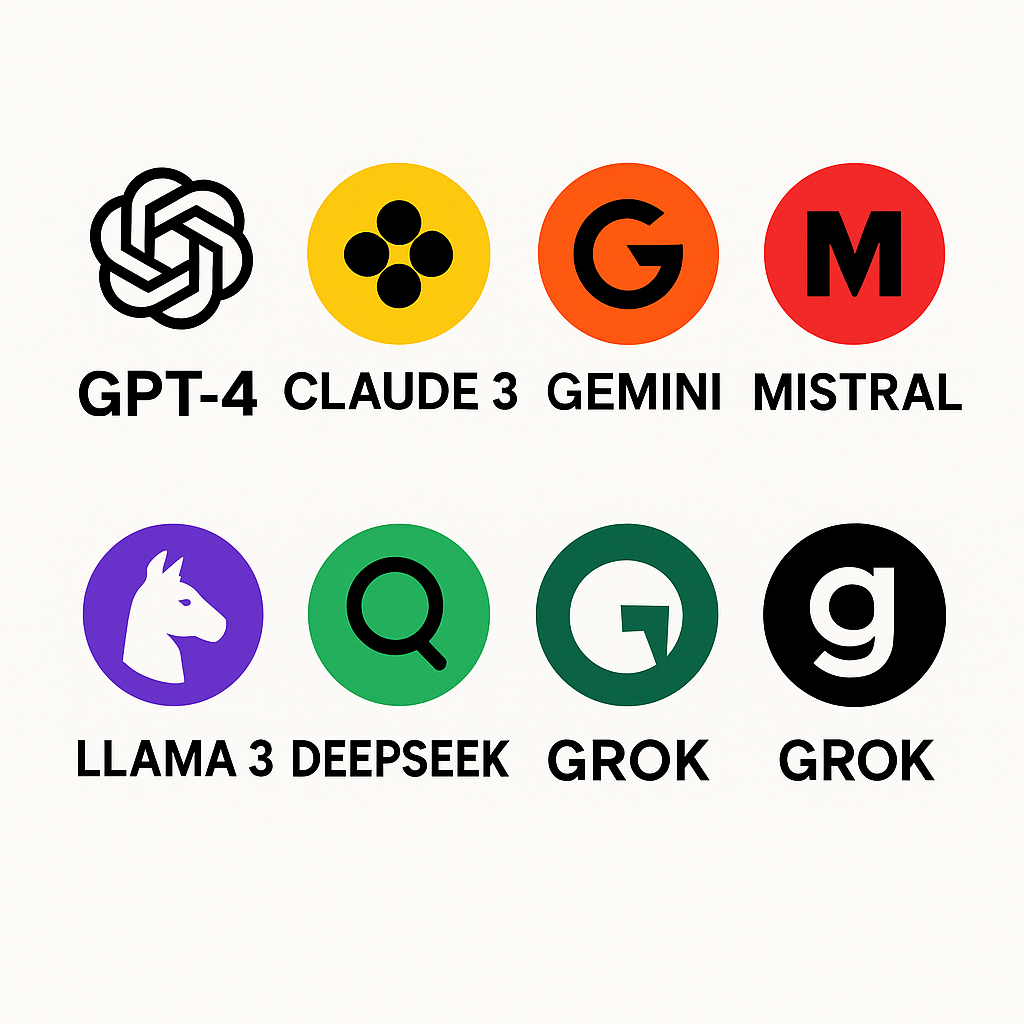The revolution no one saw coming
In the last year, the world has been invaded by artificial intelligences. From the powerful GPT-4 to the irreverent Grok, each one has its style, its talents… and its flaws.
But which one is best for you? It depends on what you want to do.
Here I explain how they work, what they’re for, with real examples and a comparative table at the end so you can choose well.

🔵 GPT-4 / GPT-4o (OpenAI)
Strengths:
- Extremely high natural language understanding
- Excellent at writing, programming, problem solving
- Multimodal (text, image, voice and audio)
Weaknesses:
- Can invent false answers (hallucinations)
- Cannot be used offline
- Not open source
🧩 Real example: Startups use it as a legal assistant to generate simple contracts. In education, many teachers use it to create exams and rubrics.
🟡 Claude 3 (Anthropic)
Strengths:
- Very ethical and safe: responds with caution
- Ideal for long texts, summaries, and content review
- Friendly and professional style
Weaknesses:
- Avoids sensitive topics
- Not as powerful in programming
- Doesn’t run locally
🧩 Real example: An NGO uses it to filter biases in their communications before publishing them.
🟠 Gemini (Google)
Strengths:
- Integration with Gmail, Docs, YouTube
- Capable of analyzing images and visual data
- Fast for productivity tasks
Weaknesses:
- Less creative or conversational
- Not open source
- Doesn’t stand out outside the Google ecosystem
🧩 Real example: A marketer uses it to summarize emails, generate ideas for presentations, and organize tasks in Google Calendar.
🔴 Mistral / Mixtral (Open Source)
Strengths:
- Fast, lightweight and runs offline
- 100% open source
- Ideal for developers who want total control
Weaknesses:
- Requires technical configuration
- Less expressive in natural language
- Not multimodal
🧩 Real example: A digital farmer in Chile uses it connected to WhatsApp to check his business inventory without paying subscriptions.
🟣 LLaMA 3 (Meta)
Strengths:
- Excellent foundation for building your own solutions
- Very good at data analysis, financial models, and code
- Used by universities and startups
Weaknesses:
- No easy-to-use public app
- Requires powerful servers
- Limited for casual conversations
🧩 Real example: A university uses it to create an assistant that answers student questions about courses.
🟢 DeepSeek (China)
Strengths:
- Powerful in mathematics, logic, and programming
- Works locally and is open source
- Ideal for technical and scientific tasks
Weaknesses:
- Weak in natural interaction and creativity
- More useful in Chinese and English
- Not multimodal
🧩 Real example: Engineers use it in closed laboratories without internet access to solve complex programming problems.
⚫️ Grok (xAI / Elon Musk)
Strengths:
- Integrated with X (Twitter)
- Sarcastic, direct tone, with Musk-style humor
- Real-time access to trends on X
Weaknesses:
- Doesn’t work outside the social network
- Biased by Musk’s ideological vision
- Not useful for complex or professional tasks
🧩 Real example: Content creators use it to generate viral tweets, respond to trolls, or comment on daily news.
📊 Comparative Table
| AI | Creativity 🎨 | Code 👨💻 | Ethics 🔐 | Offline 🖥️ | Images 🖼️ | Humor 😅 |
|---|---|---|---|---|---|---|
| GPT-4o | ⭐⭐⭐⭐ | ⭐⭐⭐⭐ | ⭐⭐⭐ | ❌ | ✅ | ⭐⭐ |
| Claude | ⭐⭐⭐⭐ | ⭐⭐ | ⭐⭐⭐⭐⭐ | ❌ | ❌ | ⭐⭐ |
| Gemini | ⭐⭐ | ⭐⭐ | ⭐⭐⭐ | ❌ | ⭐⭐⭐ | ⭐ |
| Mistral | ⭐⭐ | ⭐⭐⭐⭐ | ⭐⭐ | ✅ | ❌ | ⭐ |
| LLaMA | ⭐⭐ | ⭐⭐⭐⭐ | ⭐⭐ | ✅ | ❌ | ⭐ |
| DeepSeek | ⭐ | ⭐⭐⭐⭐⭐ | ⭐⭐ | ✅ | ❌ | ❌ |
| Grok | ⭐ | ⭐ | ⭐ | ❌ | ❌ | ⭐⭐⭐⭐ |
🎯 Which one is for you?
| Profile | Recommendation |
|---|---|
| 💼 Busy professional | Claude or Gemini |
| 🧑💻 Technical programmer | DeepSeek or Mistral |
| 🎨 Creative or marketer | GPT-4o |
| 📶 With poor connection | Mistral or LLaMA |
| 📢 Content creator | Grok |
| 🔬 Researcher | LLaMA or Claude |
🔌 Platform Integration: Which one is easier to use?
GPT-4o (OpenAI)
- Easiest to integrate: Well-documented APIs, SDKs for all languages
- Platforms: Cursor IDE, VS Code, Notion, Zapier, Slack
- Advantage: Largest community, many tutorials and examples
Claude (Anthropic)
- Medium integration: Good APIs, but less documentation
- Platforms: Slack, Notion, some code editors
- Advantage: Very good for analyzing long documents
Gemini (Google)
- Excellent integration: Integrates natively with the entire Google ecosystem
- Platforms: Gmail, Docs, Sheets, Calendar, Chrome
- Advantage: If you use Google Workspace, it’s the most natural option
Mistral / LLaMA (Open Source)
- Technical integration: Requires programming knowledge
- Platforms: Ollama, custom applications, local servers
- Advantage: Total control, but you need to be technical
DeepSeek
- Limited integration: Mainly for developers
- Platforms: Console, specialized applications
- Advantage: Powerful for specific technical tasks
Grok
- Minimal integration: Only works on X (Twitter)
- Platforms: X/Twitter exclusively
- Advantage: If you live on Twitter, it’s perfectly integrated
💰 Pricing and tokens: How much does it really cost?
How do tokens work? Tokens are units of text that AIs process. A word is usually 1-2 tokens. For example, “Hello world” = 2 tokens.
GPT-4o (OpenAI)
- Pricing: $5 USD/month (GPT Plus) or $0.03/1M tokens input, $0.06/1M tokens output
- Limit: 128K tokens per conversation
- Advantage: Fixed monthly plan for intensive use
Claude 3 (Anthropic)
- Pricing: $20 USD/month (Claude Pro) or $0.015/1M tokens input, $0.075/1M tokens output
- Limit: 200K tokens per conversation
- Advantage: Better price per token, but more expensive monthly plan
Gemini (Google)
- Pricing: Free (with limits) or $0.0025/1M tokens input, $0.01/1M tokens output
- Limit: 1M tokens per conversation
- Advantage: Cheapest per token, but less powerful
Mistral / LLaMA (Open Source)
- Pricing: Free (running locally)
- Limit: Depends on your hardware
- Advantage: No recurring costs, but you need powerful hardware
DeepSeek
- Pricing: Free (with limits) or $0.0014/1M tokens
- Limit: 128K tokens per conversation
- Advantage: Very cheap, ideal for technical tasks
Grok
- Pricing: $16 USD/month (X Premium+)
- Limit: No clear limit
- Advantage: Includes full access to X/Twitter
💭 My personal experience
Personally, I’m still exploring AIs. For now, I only use GPT - from my point of view, it’s the most complete… plus it integrates very well with Cursor IDE.
I’ve tried some others, but GPT remains my main tool. Claude has saved me when I need to review long or sensitive texts, and Mistral blew my mind when I tried it running locally on my computer.
And Grok… well, it’s fun, but I wouldn’t use it for anything serious.
🤔 Reflections on the future
This diversity of AIs shows us something important: there’s no one-size-fits-all solution. Each one has its niche, its personality, its strengths.
And that’s good. It means we can choose the right tool for each task, instead of depending on a single AI for everything.
But it also makes me think about the future. What will happen when these AIs become even more powerful? Will we continue to have this diversity, or will one dominate over the others?
🚀 What now?
My recommendation: try several. Don’t marry just one. Each AI has something unique to offer, and the best way to take advantage of them is to know their strengths and weaknesses.
And remember: these tools are here to help us, not to replace us. Use them wisely, ethically, and always maintain your human judgment.
Final reflection
The AI revolution isn’t about choosing the most powerful model, but understanding how each one can improve your life and work.
At the end of the day, the best AI is the one that makes you more human, not less.
💬 Which one do you work or play with the most?
Leave me your experience in the comments. Has any surprised you? Which one do you think will dominate in 2026?
🔁 Share this with someone who still thinks “all AIs are the same”.
✍️ Claudio from ViaMind “Dare to imagine, create, and transform.”
Recommended links on similar and fascinating topics:
I share some articles and recommended resources if you want to know more about the different AIs:
Best Large Language Models (LLMs) of 2025 A detailed analysis of models like GPT‑4, Claude, Gemini, LLaMA and others, evaluating performance, price and use cases: 👉 https://www.techradar.com/computing/artificial-intelligence/best-llms
The best AI for coding in 2025 Comparison focused on programming tools: GPT‑4, Claude 4, Gemini 2.5 Pro and DeepSeek, with benchmark results: 👉 https://www.analyticsvidhya.com/blog/2025/05/best-ai-for-coding
The best AI agents in 2025 Guide on AI agents (beyond basic chatbots), including automation platforms, low-code frameworks and enterprise implementation: 👉 https://www.datacamp.com/es/blog/best-ai-agents
